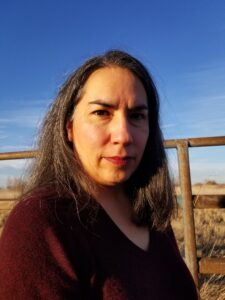Using concepts from the Supernatural television series, Sarah Augustine considers how we can imagine systems for ecological and racial justice that will create a better future for our world, even if we don’t see the return on investment in our lifetimes.
This blog was first published Feb. 1 on Sarah Augustine and Sheri Hostetler’s joint Substack account, and later shared on the Coalition to Dismantle the Doctrine of Discovery’s website. Reposted with permission.
This blog is part of the ongoing Learn, Pray, Join: Climate Justice: Seeking Shalom series. Lea la versión en inglés aquí.
 Sarah Augustine, who is a Pueblo (Tewa) descendant, is co-founder and executive director of the Coalition to Dismantle the Doctrine of Discovery. She is also the co-founder of Suriname Indigenous Health Fund, where she has worked in relationship with vulnerable Indigenous peoples since 2005. Sarah is a mother, grandmother, wife and a relative to many. She likes to can food grown by her family, hates driving and has memorized hundreds of pop songs. Sarah has a wicked sense of humor; typically, no one gets her jokes.
Sarah Augustine, who is a Pueblo (Tewa) descendant, is co-founder and executive director of the Coalition to Dismantle the Doctrine of Discovery. She is also the co-founder of Suriname Indigenous Health Fund, where she has worked in relationship with vulnerable Indigenous peoples since 2005. Sarah is a mother, grandmother, wife and a relative to many. She likes to can food grown by her family, hates driving and has memorized hundreds of pop songs. Sarah has a wicked sense of humor; typically, no one gets her jokes.
_________________________________________________
“Look man: If you’ve got something for me to punch, shoot or kill, let me know, and I’ll do it. I’ll do it until I die. But how are we supposed to fix the friggin’ sun?” — Dean Winchester, Supernatural, season 11, episode 23
It is the end of the world. Again.
The forces of darkness and light are locked in an epic battle, and light is losing. The fate of all of creation hangs in the balance; failure will mean the end of all life. Creation itself is damaged, as the balance tips toward darkness, and the sun begins to fail.
Dean voices something we all crave — the Identification of a bad guy, a “level boss” in video game parlance. If we can identify the villain and eliminate them, we can change the world. But what happens when the source of life — the very sun in this Supernatural episode — begins to fail? How can we fix that?
There is a way in which this feels familiar. Ecological overshoot, as evidenced by climate change, has put this generation in a precarious place. Life will not go on as it has. The climate is beginning to change, and stopping it feels beyond our control. We know that our collective extractive culture can make things much worse, but attempts to right the ship feels like too little, too late.
Those who have historically benefited from settler colonialism — white folks — tend to trust our societal institutions. We believe that, if we can explain what is happening in an effective way, those with the power to change things will be persuaded by our sensible arguments.
There is a point when I see in the eyes of our friends, our colleagues, our relatives that they finally see the world as it is. This takes time but is inevitable: to see through the illusion of one’s own privilege. Yes, it is a privilege to believe that our systems are basically good, or at least well-intentioned. It is a privilege to believe that cooperation and clear communication can right most wrongs.
The world in which we find ourselves is not based on a misunderstanding, where decision-makers lack a crucial piece of information that our good intentions might supply. What is amiss is not profound miscommunication, which can simply be righted by conveying our perspective. Greta Thunberg is learning this the hard way, demonstrating it to all of us in real time.
No, we live in a constructed reality that demands inequality. Decision-makers know well what their wealth and status depend on — exploitation of the most vulnerable. One may as well petition the all-knowing wizard of Oz for a heart or a brain as petition international institutions. There is no wise-and-powerful higher authority one can appeal to. There are simply the systems of human society that have been built using the tools of capitalism and extractive industry, which require tributes of land and labor.
Confronting these systems — seeking to change them — feels impossible.
We do not have the power to fix the sun any more than we have the power to change the human systems into which we are born. We can only travel the slow road of multi-generational work, collaborate to build leverage, and then, exercise that leverage to resist the forces of extraction and exploitation.
For me, this realization occurred at a dinner meeting with an Inter-American Development Bank program director in the small country of Suriname. He clearly explained to my husband, Dan, and me that Indigenous people are a barrier to progress and will not be allowed to stand in the way of economic development. According to this administrator, his institution has a program of planned obsolescence, in which Indigenous people would be gone in two generations. He understood perfectly well that this would cost displacement, disease and death in human lives, but he found these costs acceptable. He understood the research better than we did; in fact, his agency was a major source of international research on the human costs of economic development. None of my words would persuade him; he was conducting a plan that had been carefully calculated.
This indifference to human suffering did not make me feel powerless; it made me angry. It gave me a sharp vision, through which all of the illusions of my own good intentions were burned away. I could either choose to stand on the sidelines, effectively affirming the authority of financial institutions to seek profit above all other interests, or I could engage in the struggle alongside Indigenous land and water protectors.
We must accept that resistance is an end in itself. In the face of overwhelming injustice, resistance is the only ethical human response. As I travel around the country, speaking and organizing, many people tell me that they cannot get involved if they cannot see results in their own lifetimes.
Imagine if abolitionists had behaved this way: Over 15% of our country’s population would still be enslaved. Imagine if suffrage activists had behaved this way: Half of us still would not have the opportunity to go to college, or the right to vote, or access to birth control. Imagine if labor activists had not insisted on just labor laws: None of us would have a weekend, and nearly half of us would not be able to even go to elementary school because we would work through childhood.
We must resist the forces of inertia, of privilege, of blindness. We must choose to struggle, because it is the right thing to do — the human thing to do — regardless of whether or not we believe we will see a decent return on our efforts.
Maybe it is not possible to single-handedly fix the sun. But it is possible to collectively imagine systems that do not require burning it up as the only option. It is possible to struggle to displace the systems that seek to destroy us, and to dream forth liberation — the kindom of God.
Those who went before us dreamt of an end to slavery, universal suffrage for women, two days of rest for every five days of labor. We can dream forth an end to the systems that bind us now. It is possible, if we lean on what has been built by the ones who struggled for liberation before us and if we have faith in the ones who will come after us. We may not see liberation with our own eyes, but that is the definition of faith — to believe in something (justice) that seems impossible.
We, this generation, are not alone, and what we have to give is vital. For the ones who will come after us to complete the work, those of us alive now must take up the work of transformation.

As followers of Jesus, we seek God’s dream of shalom for all people and all of creation, including our climate. Shalom requires that we seek justice and healing for our relationships with God, with one another and with the earth that sustains us.
You are invited to get involved with Learn, Pray, Join: Climate Justice: Seeking Shalom.
Support Mennonite Church USA’s Peace and Justice Initiatives by giving here.
The views and opinions expressed in this blog belong to the author and are not intended to represent the views of the MC USA Executive Board or staff.
Interested in submitting a blog for Menno Snapshots? Please see our blog guidelines here.

